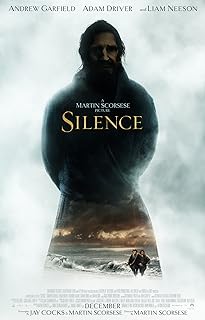
2017-01-21 22:01:53
通過宗教,談談哲學—《沉默》的四個主題
Scorsese歷時多年的宗教大作。全篇將近三小時,以宗教的矛盾與衝突為主線隱形的探討了很多有關信仰與人性的主題。下面是我和好友(美國)的兩篇影評,本人的主要探討有感受的四個層面,排序由明顯/主要到隱性;主要基於電影主題的討論,並不太牽扯電影具體情節與結局。好友的是英文的,以對比斯科塞斯不同主題電影以及《沉默》的主題與細節,牽扯大量劇透,未看電影的請止步於我的結尾。 一點背景資料:故事發生在1634年的德川幕府控制下的日本社會,而1633-1639年日本逐漸進入閉關鎖國階段。歐洲同時段天主教、東正教與新教進行著三十來年的爭鬥, 1634年天主教獲得了短暫勝利,而1648年,以哈布斯堡家族為代表的天主教失敗並簽訂《威斯特伐利亞和約》,承認新教平等宗教地位而告終。六個世紀前的歐亞大陸充斥著十來次十字軍東征的宗教之戰。幾百年來的歐亞大陸沒少有不同宗教之間甚至同宗教不同派別之間的迫害與死亡。 《沉默》第一層很明顯也很主線的概念大概就是「宗教是很個人的東西」了。Scorsese想傳達的主要資訊之一可能就是宗教的個人性了。誠然,正如影片所敘述的溫度以及大家在現實生活中所聽到的所謂「政治正確」的一種判斷:宗教是很個人的,宗教應該是自由的。然而這個看似很簡單的論述其實包含了很多個不同層面的涵義。對於某個個人而言,不論是信仰類別、派系、實踐方式還是信仰深淺、是否多信仰並存,甚至是否改變信仰——這些其實都是「宗教」之名所牽扯到的自由。在這樣的前提下,宗教信仰的自由與政府國家的關係應該是怎樣的?某個人的宗教派系、信仰深淺、以及是否變更是否能被別人加以評論、指責、或是要求改變?表面的故事中,政府明顯不該強迫操控(或者例如某國和某國變相強迫個人的宗教與信仰)。然而深層情節中,他人是否有權力批判或者指責某個人變更宗教(或是看似變更宗教)的選擇?我覺得這個答案是不能,因為當你無法了解一個人內心的時候,你便無法了解一個人信念、意義以及追求的選擇;在不了解其意義選擇的前提下,你無法對一個人做出的行為以你的意義選擇標準作出評價。費列羅的選擇是對還是錯,恐怕男主是沒資格評論的;而男主自己的選擇究竟是與非,也只有他自己有資格評判。
扯的遠一點,現代社會大家都太習慣於建立在自己意義的選擇上評論他人的所作所為了,而又因為自己意義選擇的正當性而不去考慮是否適合用於評判別人------「這個人太不獨立了整天只知道黏著他媽不知道奮進。」但如果你知道在他爸爸一年前突然心臟病去世的當天他突然意識到原來父母才是最知道花時間陪伴的時候,你是否還能做出同樣的評論。「 豆瓣和直播平台相比,投入了那麼多錢卻只拿到如此少的收益,可見對商業模式的提前規劃以及收益模式的明確探索還是非常重要的。」 我沒採訪過豆瓣創始人所以我不評論,不過該作者有問過豆瓣團隊是如何看待其產品意義的嗎?再扯回來,男主以及很多屆時的歐洲基督教人士為費列羅的「宗教叛變」而羞恥和憤恨和指責的時候,他們真正了解費列羅的內心嗎?對於某宗教實踐的放棄是否等同於放棄信仰? 提到指責以及改變,就不得不提第二層電影表達出的主題——宗教的本質到底是什麼。宗教的本質到底是具象化的宗教代表人物、行教方式和特定的宗教故事?還是其背後真正所代表的某種更深層次的信念、理念與追求? 在這二者之間是否存在一種手段與目的之間的關係?耶穌與神與《聖經》與十字架,佛祖與《釋迦牟尼佛傳》與經輪,安拉與《古蘭經》與婦女頭巾,這些本質上究竟是某種精神與信仰的代表物還是信仰的本身?在做一件事的時候,什麼是手段,什麼是目的?在信仰這件事上呢?現實生活中會不會有情況使得代表信仰的象徵與真正信仰所代表的理念與精神與追求形成了矛盾?影片中作為基督教象徵的耶穌象,如果對其不尊導致的是摯愛的親人友人以及鄰裡的家破人亡,那麼到底什麼才是「基督教」從最本質上想讓你做出的決定?為了維護特定的象徵而在實際中違背了博愛的道義,到底孰是孰非,孰輕孰重。當手段變成了阻擋其自身目的的時候,什麼是真正的選擇。韓信能容跨下之辱,一個信徒在信念的象徵與真正的信念之間產生重大矛盾的時候,能否放下那一刻服務於尊重與尊嚴的象徵,而選擇追隨內心深處宗教和信仰的精神,為那些虔誠卻無辜的民眾所服務? 第三層電影中討論到的主題是「絕對的真理」。大家可能從電影一開頭就能看到德川幕府對於強加佛教於民眾身上的強迫性。然而男主羅德里格茲有沒有著略微類似的信念——傳播基督教普世的真理,積極改變遠東社會?這裡想談談努力執著於將自己的信念傳播給他人的必要性。到底什麼才是男主口中所謂的「Truth」, 除了一些被驗證的科學原理與事實以外(甚至這些都隨時有被新發現推翻的可能性),到底有沒有什麼是絕對的真理? 如果有的話,到底什麼才是絕對的真理。 尤瓦爾·赫拉利在《人類簡史》中提出了一個主要觀點,即人類社會是建立在無數的共同虛構與想像之上的:宗教是群體的共同想像,黨派是人類的共同虛構與想像,對某種事物的熱愛也是建立在一群人共同的虛構與想像之上的。既然如果都是想像與虛構的共同體,其之間是否有高低之分,真假之別?在此之上,及時某個人或者某群體有著深深的宗教或者政治或者藝術理念,在多大程度上他可以施加於人?另外即使是宇宙真理,個人是否有權利選擇不予置信? 第四層想探討的主題是:宗教對與錯的判斷是否能夠建立在不同的社會進步程度上進行比較。基督教是西方世界的產物,恰好在那個時候西方社會較剛剛閉關鎖國的德川幕府日本社會要進步;在這樣的社會大環境下是否能夠成合理的「基督教」與「佛教」之間進步性的比較(甚至宗教之間是否有進步性這一可比較的指標存在)?片中有不少男主羅德里格茲與日本宗教督管頭目的對話透漏出日本社會屆時的落後思想,然後整個對話又是架構和包含在基於基督教與佛教之間的討論。不Scorsese是有心無意,還是囿於自身的文化限制(畢竟人人都不可避免是特定環境的產物), 還是遠藤周作有意為之,個人覺得這樣的比較稍微點有失公允。純粹的兩種宗教之間的比較,應建立在宗教教義與內涵本身而探討,而摻雜進社會環境發展狀況的宗教比較已經不僅僅是純粹的宗教比較了,而是社會的比較了。這一點是本片少有的讓人覺得略生硬的地方。在這一點之上,片子多少還有那麼一點兒美(ou)國(mei)電(she)影(hui)常(nan)有(mian)的(de) 傳播真理拯救人類的自我犧牲與自我滿足的情結。 總而言之,將宗教、信仰、人性與哲學討論的比較深刻的一部年度大片。畫面、鏡頭、背景聲音處理方面做的都蠻不錯,Scorsese也將哲學的複雜性討論的入木三分。IMDb目前評論過低,而隨著觀影人數的增加,豆瓣打分也許還有提高的可能性。以上是個人的一些想法,歡迎隨時討論。
------—-------我是分割線 -------------
下面是好友的影評,前方劇透預警:
⭐️⭐️⭐️⭐️⭐️
馬丁 Scorsese' Magnum Opus on Faith (Do not read unless you have seen the movie)
Silence is one of 馬丁 Scorsese's finest films, which is really all that needs to be said about it. It's not as masterfully paced as Goodfellas, as carefully plotted as The Departed, nor as vibrant or politically thoughtful as Gangs of 紐約, and it doesn't have a seismic performance like DeNiro in Taxi Driver or Raging Bull. But the film is an utter masterpiece through and through.
Silence is about faith. It does not lend itself to pat readings, but I think some explanations are better than others.
The very core principle of the film is that faith is deeply personal and should be respected. But Silence is a a great film because it goes beyond that: Scorsese delves into the question of how should one react when the deep underlying tenets of a religion conflict with cherished practices and commandments. This question could not be more relevant today to debates in the Pope Francis era of the Catholic Faith or for questions regarding the modernization of Muslim practices. Scorsese comes, correctly in my view, with a preference for underlying principles over practices and specific commandments.
Let me explain why this is the position he takes. First, Father Rodrigues often tells others to apostasize. But he holds out himself: he sees himself as a martyr figures. We tend to take his point of view, but when Father Ferreira tells him that this view is arrogant- that comparing oneself to Jesus- is immodest this is a powerful rebuke.
Second, Father Garrupe did not apostasize and his fate is telling. He desperately swam out to sea to save those drowning. But all he does kill himself while not saving the other. His body floats in the water, face down. His is not the death of a martyr, but the death of a man who impractically failed to renounce his faith to save others. Standing from afar, Rodrigues wants him to give in. He can see that it is stubborness and to some extent self-importance for Father Garrupe not to make this mental and spiritual sacrifice, but he cannot yet see this so plainly when he finds himself in the same situation.
The ending is also telling. I have seen multiple criticisms of the coda to the film: Silence keeps going for 15-20 minutes after the dramatic event of the film has ended. Scorsese is a man who knows how to end a movie: you can't be one of best directors of all time without that skill. He has shown himself willing to end a film immediately after a startling burst of action (The Departed), after a dramatic event with a short and surprising coda (Taxi Driver), and conventionally but incredibly effectively (Raging Bull, Gangs of 紐約, The Aviator, and Hugo). It is noteworthy that the other Scorsese which drags on longer than expected towards the end of the film is his other film about the Christian faith: The Last Temptation of Christ. The dragged out ending in Scorsese's 1988 film is about Jesus's last temptation.
All of this is to say that Scorsese carefully works on his endings. Scorsese didn't haphazardly plot the last 15 minutes as some critics suggest because Silence was long-in-the-making passion project of the director.
Rather, the film's conclusion is a careful demonstration of the fact that you can take the man from his faith, but you can't take the faith out of the man. A man can still believe even if he does not follow all of the formaltiies of the faith, so long as in his actions he stays true to the spirit of his faith.
An essay could be written about virtually every character in the movie, all of whom are deeply human. Silence also has important things to say about the tradeoffs between religious freedom and societal cohesion and the balance between blind faith and empathetic tolerance which could spawn tomes of scholarly debate.
More than anything, however, Silence is a devastating reminder that religion is a human exercise meant to benefit the people who have inhabited or will live on this Earth. We may not agree on deities we pray to, the stories behind our religion, or even many of the principles that underly our beliefs. But we should all agree that we are our brother's keeper.
Twitter @AATJ1722
blog 原文:http://aawisdomblog.blogspot.com/2017/01/martin-scorsese-magnum-opus-on-faith-do.html?m=1

